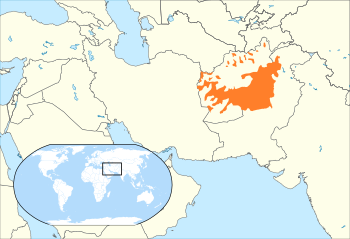پشتو
| ||||||||||||||||||||||||||||||||||||||||||
| ||||||||||||||||||||||||||||||||||||||||||
پـَشـْتو (Pashto ؛[7][8][9] rarely /ˈpæʃtoʊ/؛[Note 1][Note 2] Pashto: پښتو Pax̌tō [ˈpəʂt̪oː])، وتُعرف في الأدب الفارسي بإسم أفغاني (افغانى)[12] وفي الأدبين الأردي والهندي بإسم پاثاني Paṭhānī،[13] هي لغة في جنوب-آسيا الوسطى يتكلمها الپشتون، الذين يُسمَون أيضاً پختون وأحياناً أفغان أو پاثان.[1] وهي لغة إيرانية شرقية، تنتمي إلى العائلة الهندو-أوروپية.[14][15][16] والپشتو هي أحد اللغتين الرسميتين في أفغانستان،[5][17][18] وهي ثاني أكبر لغة إقليمية في پاكستان، ويُتكلـَّم بها في غرب وشمال غرب البلد.[19] مناطق القبائل المدارة اتحادياً (FATA) في پاكستان هي 100% تتكلم الپشتو، بينما هي لغة الأغلبية في إقليم خيبر پختونخوا والأضلع الشمالية في بلوچستان. الپشتو هي اللغة الرئيسية بين شتات الپشتون حول العالم. العدد الإجمالي للناطقين بالپشتو يُقدر بنحو 45–60 مليون شخص حول العالم.[2][20][21][22]
تنتمي الپشتو إلى المجموعة الإيرانية الشمالية الغربية من الفرع الهندو-إيراني،[23][24] ولكن إثنولوگ يُدرِجها كلغة إيرانية جنوبية شرقية.[25] والپشتو لها مجموعتان رئيسيتان من اللهجات، “ناعمة” و “خشنة”، واللاحقة تُعرف بإسم پختو.[1][1]
التوزيع الجغرافي
المفردات
| الپشتو | الفارسية | العربية | المعنى |
|---|---|---|---|
| چوپړ chopaṛ |
خدمة | Service | |
| هڅه hat͡sa |
کوشش | Effort/Try | |
| پرېکړه prekṛa |
فيصله | Decision | |
| ملګری, ملګرې malgaray, malgare |
دوست | Friend |
نظام الكتابة
تستخدم لغة الپشتو أبجدية الپشتو، التي هي صيغة معدلة من الأبجدية العربية. It has extra letters for Pashto-specific sounds. ومنذ القرن السابع عشر، أصبحت الپشتو تـُكتَب أساساً بخط النسخ، بدلاً من خط النستعليق المستخدم في أبجدية الأردو وإلى حدٍ ما في الأبجدية الفارسية.[26]
وتتكون أبجدية الپشتو من 44 حرفاً وأربع حركات تشكيل. الجدول التالي يعطي الأشكال المنعزلة للحروف، مع المناظر لها في اللاتينية والقيم المناظرة في الأبجدية الصوتية الدولية:
| ا ā, — /ɑ, ʔ/ |
ب b /b/ |
پ p /p/ |
ت t /t̪/ |
ټ ṭ /ʈ/ |
ث s /s/ |
ج j /d͡ʒ/ |
ځ ź /d͡z/ |
چ č /t͡ʃ/ |
څ c /t͡s/ |
ح h /h/ |
خ x /x/ |
| د d /d̪/ |
ډ ḍ /ɖ/ |
ذ z /z/ |
ر r /r/ |
ړ ṛ /ɺ˞~ɻ/ |
ز z /z/ |
ژ ž /ʒ/ |
ږ ǵ (or ẓ̌) /ʐ, ʝ, ɡ/ |
س s /s/ |
ش š /ʃ/ |
ښ x̌ (or ṣ̌) /ʂ, ç, x/ | |
| ص s /s/ |
ض z /z/ |
ط t /t̪/ |
ظ z /z/ |
ع — /ʔ/ |
غ ğ /ɣ/ |
ف f /f/ |
ق q /q/ |
ک k /k/ |
ګ g /ɡ/ |
ل l /l/ | |
| م m /m/ |
ن n /n/ |
ڼ ṇ /ɳ/ |
و w, ū, o /w, u, o/ |
ه h, a, ə /h, a, ə/ |
ي y, ī /j, i/ |
ې e /e/ |
ی ay, y /ai, j/ |
ۍ əi /əi/ |
ئ əi, y /əi, j/ |
اللهجات
تنقسم لهجات الپشتو إلى تنويعتين رئيسيتين، التنويعة الجنوبية “الناعمة” پشتو، والتنويعة الشمالية “الخشنة” پختو.[1] Each variety is further divided into a number of dialects. The southern dialect of Wanetsi is the most distinctive Pashto dialect.
1. التنويعة الجنوبية
- Durrani dialect (or Southern dialect)
- Kakar dialect (or Southeastern dialect)
- Shirani dialect
- Marwat-Bettani dialect
- Wanetsi dialect
- Southern Karlani group
- Khattak dialect
- Banuchi dialect
- Dawarwola dialect
- Masidwola dialect
- Wazirwola dialect
2. التنويعة الشمالية
- Central Ghilji dialect (or Northwestern dialect)
- Northern dialect (or Eastern dialect)
- Yusufzai dialect (or Northeastern dialect)
- Northern Karlani group
- Taniwola dialect
- Khosti dialect
- Zadran dialect
- Bangash-Orakzai-Turi-Zazi-Mangal dialect
- Afridi dialect
- Khogyani dialect
- Wardak dialect
الأدب
مثال من الشعر
مقتطف من كلام رحمن بابا:
زه رحمان په خپله ګرم يم چې مين يمه
چې دا نور ټوپن مې بولي ګرم په څه
Zə Rahmɑn pə xpəla gram jam t͡ʃe majan jama
t͡ʃe d̪ɑ nor ʈopan me boli gram pə t͡sə
'I Rahman, myself am guilty that I am a lover,
On what does this other universe call me guilty.'
متلونا [الأمثال]
Pashto also has a rich heritage of proverbs or matalūna.[27] An example matal [proverb]:
اوبه په ډانګ نه بېليږي
'Water does not separate with a pole [hitting it]'
This matal philosophically means that things which by their nature are destined to be united, force can not separate them.
A larger collection of Pashto proverbs of 1,350 proverbs is by Bartlotti and Khattak (2006),[28] a revised and expanded version of an earlier work by Tair and Edwards (1982).
انظر أيضاً
ملاحظات
- ^ The only American pronunciation listed by Oxford Online Dictionaries, /ˈpæʃtoʊ/,[10] is so rare that it is not even mentioned by the American Heritage and Merriam-Webster dictionaries.
- ^ وأحياناً تُكتب "Pushtu" أو "Pushto",[8][9] and then either pronounced the same[11] or differently.[8][9] The spelling "Pakhto" is so rare that it is not even mentioned by any major English dictionaries or even recognized by major English-Pashto dictionaries such as Thepashto.com, and it is specifically listed by Ethnologue.com only as an alternative name for Northern Pashto, not Southern or Central Pashto.
الهامش
- ^ أ ب ت ث ج Claus, Peter J.; Diamond, Sarah; Ann Mills, Margaret (2003). South Asian Folklore: An Encyclopedia : Afghanistan, Bangladesh, India, Nepal, Pakistan, Sri Lanka. Taylor & Francis. p. 447. ISBN 9780415939195.
- ^ أ ب Penzl, Herbert; Ismail Sloan (2009). A Grammar of Pashto a Descriptive Study of the Dialect of Kandahar, Afghanistan. Ishi Press International. p. 210. ISBN 0-923891-72-2. Retrieved 2010-10-25.
Estimates of the number of Pashto speakers range from 40 million to 60 million...
- ^ Nationalencyklopedin "Världens 100 största språk 2007" The World's 100 Largest Languages in 2007 (39 مليون)
- ^ قالب:ELL2
- ^ أ ب دستور أفغانستان – Chapter 1 The State, Article 16 (Languages) and Article 20 (Anthem)
- ^ Sebeok, Thomas Albert (1976). Current Trends in Linguistics: Index. Walter de Gruyter. p. 705.
- ^ "Dictionary and Thesaurus - Merriam-Webster". merriam-webster.com. Retrieved 18 July 2016.
- ^ أ ب ت Company, Houghton Mifflin Harcourt Publishing. "The American Heritage Dictionary entry: Pashto". ahdictionary.com. Retrieved 18 July 2016.
- ^ أ ب ت "Pashto" in Oxford Online Dictionaries, UK English
- ^ "Pashto" in Oxford Online Dictionaries, US English
- ^ "Pashto - Definition, meaning & more - Collins Dictionary". collinsdictionary.com. Retrieved 18 July 2016.
- ^ خطأ استشهاد: وسم
<ref>غير صحيح؛ لا نص تم توفيره للمراجع المسماةLeyden - ^ India. Office of the Registrar General (1961). Census of India, 1961: Gujarat. Manager of Publications. pp. 142, 166, 177.
- ^ Henderson, Michael. "The Phonology of Pashto" (PDF). University of Wisconnsin Madisson. Retrieved 2012-08-20.
- ^ Henderson, Michael (1983). "Four Varieties of Pashto". Journal of the American Oriental Society (103.595-8).
- ^ Darmesteter, James (1890). Chants populaires des Afghans. Paris.
{{cite book}}: CS1 maint: location missing publisher (link) - ^ "Article Sixteen of the 2004 Constitution of Afghanistan". 2004. Retrieved 13 June 2012.
From among لغات الپشتو والداري والأوزبك والتركماني والبلوچي والپشاي والنورستاني والپاميري (ألسنا) والعربية واللغات الأخرى المُتكلَم بها في البلد، الپشتو والداري هما اللغتان الرسميتان للدولة.
- ^ Banting, Erinn (2003). Afghanistan: The land. Crabtree Publishing Company. p. 4. ISBN 0-7787-9335-4. Retrieved 2010-08-22.
- ^ Population by Mother Tongue, Population Census - مكتب إحصاء پاكستان، حكومة پاكستان
- ^ Paul M. Lewis, ed. (2009). "Pashto, Northern". SIL International. Dallas, Texas: Ethnologue: Languages of the World, Sixteenth edition. Retrieved 2010-09-18.
Ethnic population: 49,529,000 possibly total Pashto in all countries.
- ^ "Pashto". Omniglot.com. Retrieved 2010-10-25.
The exact number of Pashto speakers is not known for sure, but most estimates range from 45 million to 55 million.
- ^ Thomson, Gale (2007). Countries of the World & Their Leaders Yearbook 08. Vol. 2. European Union: Indo-European Association. p. 84. ISBN 0-7876-8108-3. Retrieved 2010-10-25.
- ^ خطأ استشهاد: وسم
<ref>غير صحيح؛ لا نص تم توفيره للمراجع المسماةIranica-Pashto - ^ Nicholas Sims-Williams, Eastern Iranian languages, in Encyclopaedia Iranica, Online Edition, 2010. "The Modern Eastern Iranian languages are even more numerous and varied. Most of them are classified as North-Eastern: Ossetic; Yaghnobi (which derives from a dialect closely related to Sogdian); the Shughni group (Shughni, Roshani, Khufi, Bartangi, Roshorvi, Sarikoli), with which Yaz-1ghulami (Sokolova 1967) and the now extinct Wanji (J. Payne in Schmitt, p. 420) are closely linked; Ishkashmi, Sanglichi, and Zebaki; Wakhi; Munji and Yidgha; and Pashto."
- ^ Paul M. Lewis, ed. (2009). "Pashto Family Tree". SIL International. Dallas, Texas: Ethnologue: Languages of the World, Sixteenth edition. Retrieved 2011-04-02.
- ^ John Hladczuk (1992). International Handbook of Reading Education. Greenwood Publishing Group. p. 148. ISBN 9780313262531.
- ^ Zellem, Edward (2014). Mataluna: 151 Afghan Pashto Proverbs. Cultures Direct Press. ISBN 978-0692215180.
- ^ Bartlotti, Leonard and Raj Wali Shah Khattak, eds. 2006. Rohi Mataluna: Pashto Proverbs, (revised and expanded edition). First edition by Mohammad Nawaz Tair and Thomas C. Edwards, eds. Peshawar, Pakistan: Interlit and Pashto Academy, Peshawar University.
ببليوگرافيا
- Schmidt, Rüdiger (ed.) (1989). Compendium Linguarum Iranicarum. Wiesbaden: Reichert. ISBN 3-88226-413-6.
{{cite book}}:|first=has generic name (help) - Gusain, Lakhan (2008?) A Grammar of Pashto. Ann Arbor, MI: Northside Publishers.
- Georg Morgenstierne (1926) Report on a Linguistic Mission to Afghanistan. Instituttet for Sammenlignende Kulturforskning, Serie C I-2. Oslo. ISBN 0-923891-09-9
- Daniel G. Hallberg (1992) Pashto, Waneci, Ormuri (Sociolinguistic Survey of Northern Pakistan, 4). National Institute of Pakistani Studies, 176 pp. ISBN 969-8023-14-3.
- Herbert Penzl A Grammar of Pashto: A Descriptive Study of the Dialect of Kandahar, Afghanistan, ISBN 0-923891-72-2
- Herbert Penzl A Reader of Pashto, ISBN 0-923891-71-4
وصلات خارجية
- Pashto Dictionary with Phonetic Keyboard & Auto-Suggestion
- Pashto Language & Identity Formation in Pakistan
- Indo-Aryan identity of Pashto
- Henry George Raverty. A Dictionary of the Puk'hto, Pus'hto, or Language of the Afghans. Second edition, with considerable additions. London: Williams and Norgate, 1867.
- D. N. MacKenzie, “A Standard Pashto”, Khyber.org
- Freeware Online Pashto Dictionaries
- A Pashto Word List
- Origins of Pashto
- Resources for the Study of the Pashto Language
- CS1 maint: location missing publisher
- Articles containing Pashto-language text
- Languages with ISO 639-2 code
- Languages with ISO 639-1 code
- ISO language articles citing sources other than Ethnologue
- Language articles with unsupported infobox fields
- Pages using Lang-xx templates
- Articles containing فارسية-language text
- Articles with hatnote templates targeting a nonexistent page
- Articles containing explicitly cited عربية-language text
- Portal templates with default image
- CS1 errors: generic name
- پشتو
- Fusional languages
- لغات أفغانستان
- لغات بلوچستان، پاكستان
- لغات خيبر پختونخوا
- لغات پاكستان
- لغات مناطق القبائل المدارة اتحادياً
- Subject–object–verb languages
- Articles citing Nationalencyklopedin



